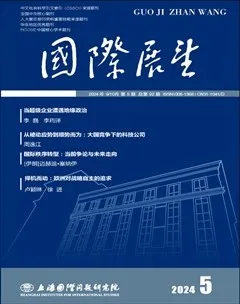英文摘要
Abstracts
BigTechinGeopolitics:TSMCintheCrossfireofChina-U.S.StrategicCompetition
LIWeiandLIYuyi
Abstract:TaiwanSemiconductorManufacturingCompany(TSMC),hailedastheworld’sleadingchipfoundry,exemplifiesthenotionofa“superenterprise”duetoitsmasteryofcoremanufacturingtechnologiesanddominantglobalmarketshare.Despiteitscommercialsuccess,TSMCfindsitselfensnaredina“dilemma”amidescalatinggeopoliticaltensions,forcingthecompanytomakebusinessdecisionsthatcontravenetheprinciplesofeconomicefficiencyandcomparativeadvantage.ThisdilemmaarisesfromTSMC’shighlyglobalizednature,whereinitreliesheavilyonboththeUnitedStatesfortechnologyandcapital,andChinesemainlandformarketaccessandindustrialecosystemsupport.TheintensifyingstrategiccompetitionbetweenChinaandtheUnitedStatesoverthesemiconductorindustryhasplacedTSMCinaprecariousposition,asitfacesthegrowingriskofeconomicelementsbeing“weaponized”bybothpowers.Consequently,TSMCisunabletofullyalignwitheitherside,norcaniteasilynavigateapaththatbenefitsfromboth.Instead,itmusttreadcarefullyinahighlychallengingenvironment.TSMC’ssituationservesasaclassicexampleofhowgreat-powerrivalryexertspressureonasuperenterprise,influencingitsstrategicbusinessdecisions.Thiscasestudy,inturn,providesamicro-levelviewofhowthegeopoliticallandscapeshapesthebroaderinternationaleconomicorder.
Keywords:bigtech,dilemma,China-U.S.strategiccompetition,weaponizedfactorsofproduction,TSMC
TheBasicLogicofChina-U.S.EconomicRelations:LongCycleandCompetition
WANGZhongmei
Abstract:Inthewakeofthe2007-2008U.S.financialcrisis,besidestheeconomiccyclefactors,containingChina’srisingandwinninginstrategiccompetitionhavebecomeacrucialconsiderationinU.S.tradepolicy.Ascountercyclicalregulationandindustrialstrategyarenotcompletelysynchronized,andthereissometimesaconflictbetweenthetwo,itappearstobeinevitablethatcompetitionbetweenestablishedandemergingpowerswillresultinpolicydistortions.However,thelong-cycletheorymaybeabletoprovideaperspectivetoexplainthattheyarecomplementary,asunderlong-termobjectivesthegreatpowerwillcoordinatethecyclicalregulationandstrategiccompetitioninthesamedirection.ThecorecontentoftheeconomicrelationshipbetweenChinaandtheUnitedStatesatpresentandinthefutureistocompeteforthenextlong-cycleadvantage–technologicalcompetitiveness.AlthoughinthepastChinahasbeenheavilyinfluencedbycyclicalregulationandactivecompetitionimposedbytheUnitedStates,China’stradepolicyisgraduallybecomingmoreindependentandautonomous.
Keywords:China-U.S.relations,economics,longcycle,competition
FromPassiveAdaptationtoProactiveAlignment:TechCompaniesinGreatPowerCompetition
ZHOUYijiang
Abstract:Theroleoftechnologycompaniesasgeopoliticalactorshasbeenunderexploredinacademicdiscussions.Astechnologyincreasinglybecomesastrategictoolfornationstosecuretheirinterestsandexertinfluenceinaneraofgreatpowercompetition,thepowerdynamicsandinterdependenciesbetweentechcompaniesandsovereignstatesareundergoingsignificantshifts.&nbs17BBX57Oo05RdWn7yBQQEA==p;Technologycompanies,leveragingtheirleadingroleintechnologicalinnovation,arebecomingcriticalplayersinshapingnationalinnovationcapabilities,domesticgovernance,andoverallnationalpower.Inthisevolvinglandscape,techcompaniesaremovingfrompassivelyadaptingtoproactivelyaligning,activelyparticipatingingeopoliticalstrugglesandinfluencingpolicy-makingtofurthertheircommercialgoals.Throughin-dezitpbL0wRM+EqNvBjeDO2A==pthinterviewswith25professionalsandscholarsinthefieldofartificialintelligence,thispaperexaminestheactionsofthreecompanies—Intel,MistralAI,andOpenAI—touncoverthelogicbehindtheirproactivealignmentandidentifyfourmainrisksassociatedwithit:imbalancedresourceallocation,ineffectiveregulation,weakenedinternationalcooperation,anddistortedecosystems.Therefore,itisimperativeforstatestocarefullymanagethepowerandinterestconflictsposedbytheriseofbigtech.Simultaneously,theymustrecognizetheessentialroleoftechcompaniesinshapingtheglobalpoliticalandeconomicorder,promoteinternationalcooperationwithopennessandinclusivity,andcollaborativelysteertechnologicalinnovationforthebettermentofhumanity.
Keywords:technologycompanies,artificialintelligence,greatpowercompetition,technologyregulation,globalgovernance
TheTransitionofInternationalOrder:CurrentDebatesandFutureDirection
[Iran]MehdiSanaei
Abstract:TheearlythirdmillenniumADwitnessedtheoutbreakofglobalcrisesandchallengesthatexposedtheweaknessofthepossibleunilateralorderandthenegativeaspectsofglobalization.Thisledtoawidespreaddebateamonginternationalrelationsthinkersaboutthetransitionperiodandthefutureoftheworldorder.Therecentoccurrenceoftwomajorglobalcrises,namely,thespreadofCovid-19andthewarinUkraine,hasacceleratedthistransition,promptingrepresentativesofdifferentschoolsofinternationalrelationstoprovidevariousscenariosaboutthefutureoftheworldorder.Thesescenarioscanbeclassifiedintoafewcategories,includingtherevivaloftheunipolarorderinanewtrend,multipolarorder,newbipolarorder,theworldwithoutpoles,andtheemergenceofmultipleregionalhegemons.However,duetothedifferencesandgapsintheconsolidationofpowercenters,aswellasthelackofagreementontherules,itisunlikelythatany ofthesescenarioswillberealizedintheshortterm.Withouttheemergenceofapervasiveandtangiblethreatorafundamentalchangeinthepoliticalcultureofmankind,therulesandstructuresofthepreviousorderwillcontinuetoexistweakly.Thetransitionperiodwillbeextended,andinstabilitywillintensify.Therefore,itisessentialtomanagethistransitionperiodpeacefullybyexpandingregionalallianceswhilerespectingtheculturalandcivilizationaldifferencesoftheactors.Theformationofanewworldordercanonlybeachievedifthereisadialogueofpowersandaconsensusontherulesthatgoverntheinternationalsystem.Untilthen,theinternationalcommunitymustfocusonmaintainingstabilityandmanagingthetransitionperiodtoensureapeacefultransitiontothefutureorder.
Keywords:internationalorder,transition,neworder,worldpowers
WaitingintheWings:TheEU’sQuestforStrategicAutonomy
LUYinglinandXUJin
Abstract:Usingthewindowofopportunitytheory,thispaperseekstoexplaintheconditionsunderwhichandhowEuropecanpursuestrategicautonomy.Decisionmakersusuallyperceivethewindowofopportunityasshortandshrinking,andhaveastrongerurgetopursuestrategicautonomybecauseoftheneedtotakeadvantageofthelimitedtimeavailable.Theopeningofthewindowofopportunityisinfluencedbythetriplefactorsofincreasingself-helpcapabilities,changesinthesystemicenvironment,andtheemergenceofunexpectedevents.AftertheendofWorldWarII,Europehasalwayshadthewillandbehaviortopursuestrategicautonomy,andhasshowndifferentcharacteristicsatdifferenttimes.FromtheColdWartothepresent,Europe’sautonomypracticehasgonethroughthreestagesofbreakingthroughtheColdWarpattern,confrontingtheunipolarpattern,andattemptingtobecomeakeythirdparty,andhasbeenaffectedbytheabovefactorstovaryingdegreesateachstage.Europehasmadesomeachievementsineconomictransformation,norm-setting,andsecurityanddefense,buttherearelimitstoitspursuitofstrategicautonomyduetotheconstraintsofself-helpcapabilities,theUkrainecrisis,andtransatlanticrelations.ByanalyzingthehistoryofEurope’spursuitofstrategicautonomyinapragmaticmanner,wecannotonlyrationallyexplainandpredictthecurrentandfuturestatusandprospectsofEurope’squest,butalsoprovidelessonsforChinaonhowtowinthestrategicinitiativeinthegameoftheChina-UnitedStates-Europetriangle.
Keywords:strategicautonomy,windowofopportunity,EuropeanUnion,transatlanticrelations
FromBandwagoningtoHedging:SaudiArabia’sStrategicShiftamidChina-U.S.Competition
WANGGaoyangandKANGXinyu
Abstract:AsanimportantpoleintheMiddleEast,SaudiArabiaisnotonlyapivotalcountryalongChina’sBRIroutes,butalsoalinchpinofU.S.regionalpolicyintheMiddleEast.Atpresent,China-U.S.competitionisexpandingfromtheIndo-Pacificregiontoawiderarea,andalthoughSaudiArabiaisfacingthepressurebroughtbythegreatpowergame,ithasalsoincreasedtheflexibilityandautonomyofgeostrategicadjustment.Inordertomaximizeitsowninterestsandavoidrisksatthesametime,inrecentyears,SaudiArabiahasgraduallytransformeditslong-standing“bandwagonpolicy”ofgreatpowersintoa“hedgingstrategy.”IntroducingChineseinfluenceandbreakingawayfromitslong-termunilateraldependenceontheUnitedStatesisakeypartofthisstrategy.However,theescalationofstrategiccompetitionintheMiddleEastconfrontsSaudiArabiawithadilemma.ThespaceforSaudiArabiatomaintainthe“hedgingstrategy”willbeaffectedbythesystemicpressure,thedifferentinfluencesthatChinaandtheUnitedStatesexertonSaudiArabia,andRiyadh’sabilitytocopewiththeevolvingexternalenvironment.Atpresent,thepossibilityofdramaticfluctuationsinthetrilateralrelationshipbetweenSaudiArabia,China,andtheUnitedStatesisstilllow,andforalongerperiodoftimeSaudiArabiawillstillhavemorespacetomaintainthehedgingstrategy.
Keywords:SaudiArabia,China-U.S.competition,middlepower,hedgingstrategy,bandwagoning
GlobalCivilizationInitiative:AChineseSolutionforPromotingtheDiversityofHumanCivilization
YUNXinleiandXIALiping
Abstract:TheGlobalCivilizationInitiative,withfour“commonadvocates”asitsmaincontent,isnotonlyrootedintheculturalgenesofChinesecivilization,butalsoinheritsthecivilizationideasofMarxism,andhasformedaglobalcivilizationviewofChinainthenewera.TheproposaloftheGlobalCivilizationInitiativenotonlysafeguardsthenaturallawofworldcivilizationdiversityandprovidesfundamentalguidancefordifferentcivilizationstosolvethe“clashofcivilizationstheory,”butalsoconformstothehistoricalprocessofhumansocialmodernizationandpointsoutthedirectionforcountriesaroundtheworldtoexploremodernizationindependently,andrespondstothe themeofdevelopmentandsecurityofthetimes,whichcontributestoaChinesesolutionfortheinternationalcommunitytoconstructthegardenofhumancivilization.IntheprocessofpromotingandimplementingtheGlobalCivilizationInitiative,ChinaneedstoadvanceitsmodernizationoftheruleoflawtobuildamoderncivilizationfortheChinesenation;promotethespiritofinternationalruleoflawbasedontheUnitedNationsCharterandimplementtheUnitedNationsGlobalAgendaforDialogueamongCivilizations;strengtheninternationalcooperationonintangibleculturalheritageandsharethemissionofdigitalprotectionofintangibleculturalheritage;enhanceofficialculturalcooperationmechanismsamongcountriesandenrichtheconnotationofpeopleexchangesamongnations;establishaglobalplatformfordialogueamongcivilizationsandpromotenewformsofhumancivilization.
Keywords:XiJinpingThoughtonDiplomacy,GlobalCivilizationInitiative,Chinesemodernization,diversityofcivilizations

